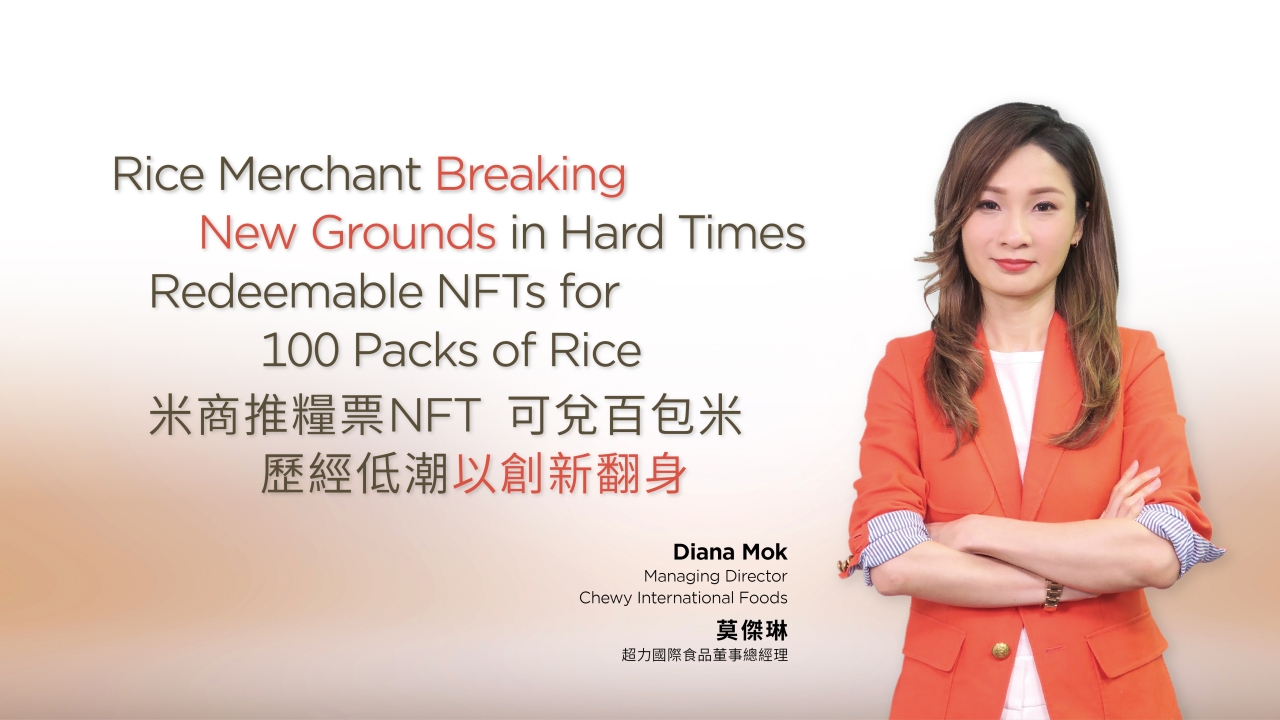
Rice Merchant Breaking New Grounds in Hard Times Redeemable NFTs for 100 Packs of Rice
The public had rushed to stock up rice in the early days of the pandemic, in fear of shortage. As rice is the main staple for Hongkongers, the Government stipulates all registered rice merchants to maintain rice stock at a level sufficient for consumption by the local population for 15 days. Chewy International Foods, one of the key local rice suppliers for more than half a century, is committed to keeping a “safety stock” and had not experienced shortage throughout the pandemic, according to Diana Mok, Managing Director of the company. With years of effort to transform the business with digitalisation and automation, Chewy is able to capture new opportunities amid turbulent times with on-going innovations and services.
Unceasing Supply Amid Disruption
Chewy is actually among the top ten rice importers in Hong Kong, despite Diana was modest about the company’s performance. It was also one of the key members of The Rice Merchants’ Association of Hong Kong to have met with the Government during the pandemic outbreak, whom were asked to raise the reserved stock of rice to 17% of annual consumption. With suppliers from the US, Canada, Italy, Japan, Korea and other places around the world, Chewy faced tremendous challenges in supply chain caused by shipment uncertainty, as well as high delivery costs that could jump by 10-fold.
“We could only play it by ear. Apart from utilising our existing stock, we also persuaded our customers to try alternatives with similar taste but from different origin. In that way we have managed to keep a stable supply throughout. A fast-food restaurant chain customer was using our supply of American rice, and hence affected by the production stand-still at that region. Fortunately, we had stocked up 30,000 packs, which is equivalent to a stock level of another three months in our warehouse, otherwise the restaurant chain would have no grain dishes on its menu. Our counterparts were skeptical about a stock level of three months that occupied their storage space, but who would have imagined that could be of any use ever!”

Innovation DNA
Chewy is currently operating 6 warehouses stashing rice and dry goods like udon noodles, including 2 cold storages spanning a footprint of 20,000 sq. ft. for frozen foods which are surging in sales. A few years ago, the company installed machineries such as rice color sorters, rice polishing machines and paddy destoners in 2 of its plants, and added robotic arms to automate some of the processes in packaging and goods transport with funding from the “Re-industrialisation Funding Scheme”.

“Digitalisation has also helped our operation to cope with the pandemic. Even when some employees had been infected, we could still remotely perform all our workflow, from procurement to delivery, the same way as we do at the office. Thanks to the well-established online ordering system that empowered our clients to place order anytime, anywhere, we did not miss a single order during the pandemic.”
Chewy was the first member of GS1 Hong Kong in 1989, and was among the first few to adopt GS1 HK’s ezTRADE platform to digitalise transaction records. There is clearly an “innovation genes” in Chewy’s company DNA. “In the old days our products were exported to overseas supermarket, we used barcodes on both the inner and outer box of the packaging for product identification to facilitate overseas trading with global merchants. We were also on the technology forefront which have adopted ezTRADE since 1996 for B2B trading order management. Today, we can even tell the origin of our product all the way back to which field it was grown.”


With its large-scale food delivery fleet in Hong Kong, the company can perform real-time tracking and tracing with the help from GS1 barcodes, GPS and RFID.
New Products & New Initiative – NFT as Grain Vouchers
Chewy’s B2B business has been badly hit under the pandemic by strict social distancing measures in the catering facilities and fluctuating shipments. Therefore, the company has pivoted quickly to B2C market with frozen, instant and healthy food product lines, such as quinoa, red rice, brown rice, and chia seeds. To celebrate the company’s 50th anniversary, it has launched limited edition of redeemable NFTs (non-fungible token) serving as grain vouchers. The NFT is of art value and practical use - owners of the NFT are eligible to redeem 100kg of rice in a 10-year period. With an average consumption of 37.2kg of rice per person per year, such amount of rice is enough to feed the owners for 3 years and immune of future rice craze - if any.
Good Relationships with Partners and Employees Lead to Good Business
Returning from a business trip in Japan on the date of interview, Diana would be on the road again to Thailand for another meeting with Thai rice merchants after 7 days of quarantine. “Even though we are doing business on daily basis for 2 years, it is still crucial to meet suppliers face-to-face to keep closer ties, so I resumed travelling as soon as the quarantine requirements of those countries are lifted.”
“My father has taught me a valuable lesson that we must treat our suppliers and employees with respect. Our relationship is built on long-term partnership but not one-off transactions, I truly believe in it and will always uphold this rule of thumb when I lead Chewy into many more milestones in the future.”

Seeing that the pandemic has dealt a blow to different industries, Diana hopes Hong Kong border could be opened soon so international trade can be resumed to normal, aligning with the quarantine-free measures in the international markets. Over time, she expects labour shortage to be a major issue as the industry still relies on manpower to carry out processes like quality check, which is irreplaceable by automation or robotics. In order to further promote re-industrialisation in Hong Kong and attract more investments, the HKSAR Government should provide support not only on capital, but also look into importation of labour and talent issue.




